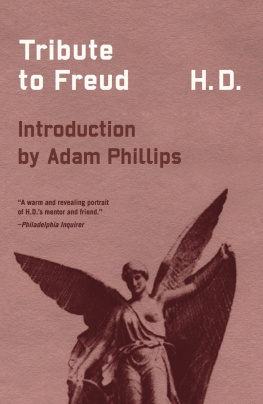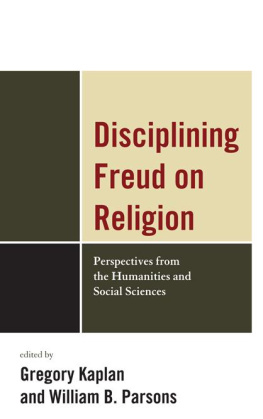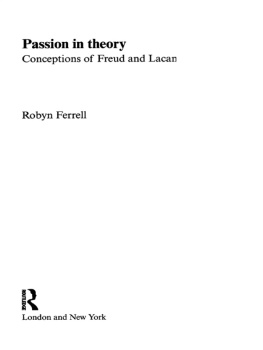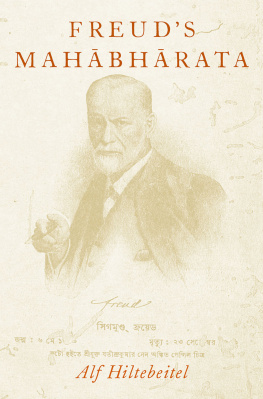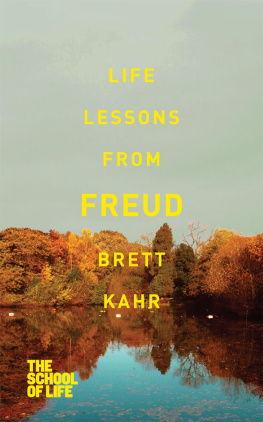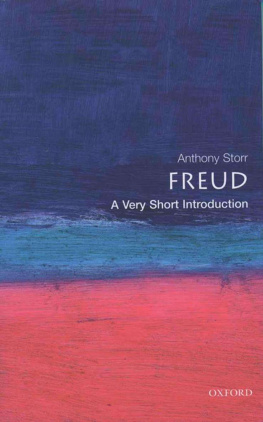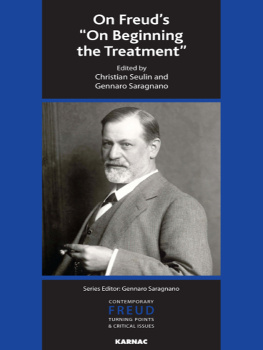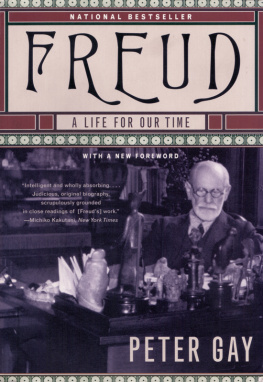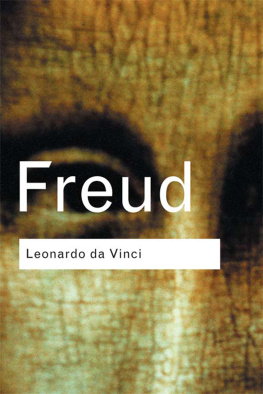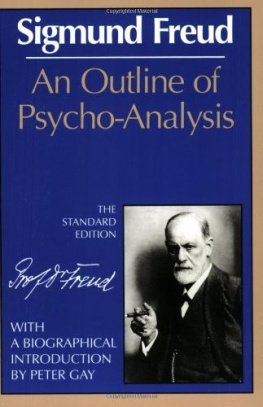Freud Sigmund - Tribute to Freud ()
Here you can read online Freud Sigmund - Tribute to Freud () full text of the book (entire story) in english for free. Download pdf and epub, get meaning, cover and reviews about this ebook. City: United States, year: 2012, publisher: New Directions Pub, genre: Art. Description of the work, (preface) as well as reviews are available. Best literature library LitArk.com created for fans of good reading and offers a wide selection of genres:
Romance novel
Science fiction
Adventure
Detective
Science
History
Home and family
Prose
Art
Politics
Computer
Non-fiction
Religion
Business
Children
Humor
Choose a favorite category and find really read worthwhile books. Enjoy immersion in the world of imagination, feel the emotions of the characters or learn something new for yourself, make an fascinating discovery.
- Book:Tribute to Freud ()
- Author:
- Publisher:New Directions Pub
- Genre:
- Year:2012
- City:United States
- Rating:5 / 5
- Favourites:Add to favourites
- Your mark:
- 100
- 1
- 2
- 3
- 4
- 5
Tribute to Freud (): summary, description and annotation
We offer to read an annotation, description, summary or preface (depends on what the author of the book "Tribute to Freud ()" wrote himself). If you haven't found the necessary information about the book — write in the comments, we will try to find it.
Tribute to Freud () — read online for free the complete book (whole text) full work
Below is the text of the book, divided by pages. System saving the place of the last page read, allows you to conveniently read the book "Tribute to Freud ()" online for free, without having to search again every time where you left off. Put a bookmark, and you can go to the page where you finished reading at any time.
Font size:
Interval:
Bookmark:
WRITING ON THE WALL
TO SIGMUND FREUD
blameless physician
It was Vienna, 19331934. I had a room in the Hotel Regina,Freiheitsplatz. I had a small calendar on my table. I counted the days andmarked them off, calculating the weeks. My sessions were limited, time went soquickly. As I stopped to leave my key at the desk, the hall porter said, Someday, will you remember me to the Professor? I said I would if the opportunityarose. He said, and ah, the Frau Professor! There is a wonderful lady. Isaid I had not met the Frau Professor but had heard that she was the perfectwife for him and there couldnt be could there? a greater possiblecompliment. The porter said, You know Berggasse? After the well, later whenthe Professor is no longer with us, they will name it Freudgasse. I went downBerggasse, turned in the familiar entrance; Berggasse 19, Wien IX, itwas. There were wide stone steps and a balustrade. Sometimes I met someone elsecoming down.
The stone staircase was curved. There were two doors on the landing.The one to the right was the Professors professional door; the one to the left,the Freud family door. Apparently, the two apartments had been arranged so thatthere should be as little confusion as possible between family and patients orstudents; there was the Professor who belonged to us, there was the Professorwho belonged to the family; it was a large family with ramifications, in-laws,distant relatives, family friends. There were other apartments above but I didnot very often pass anyone on the stairs, except the analysand whose hourpreceded mine.
My hours or sessions had been arranged for me, four days a week fromfive to six; one day, from twelve to one. At least, that was the arrangement forthe second series of sessions which, I have noted, began the end of October1934. I left a number of books and letters in Switzerland when I left there,actually after the war had begun; among them was my 1933 Vienna diary. I amunder the impression that the Professor had arranged the second series to accordwith the first, as I had often said to him that that near-evening hour wasalmost my favorite of the whole day. Anyhow, I had five weeks then. The lastsession was December 1, 1934. The first series began in March 1933 and lastedsomewhat longer, between three and four months. I had not planned on coming backto Vienna, but a great deal had happened between the summer of 1933 and theautumn of 1934. I had heard the news of the Dollfuss affair with some anxiety,but that had not caused any personal repercussions. I came back to Viennabecause I heard about the man I sometimes met, coming down the stairs. He hadbeen lecturing at a conference in Johannesburg. He flew his own plane there. Onthe way back, he crashed in Tanganyika.
I did not always pass him on the stairs. He might be lingeringon, prolonging his talk in the Professors study or consulting room, in whichcase, after hanging up my coat in the hall, I might miss him. I would be ushereddirect into the waiting room. Or it might happen that my predecessor emergedfrom the Professors sanctum at the same time that I was about to enter. Hewould be reaching for his coat or his hat while I was disposing of mine. He wasvery tall, he looked English yet English with a catch. He had, it laterappeared, spent some time at Oxford, before or after receiving his Continentaldegree in any case, he was not German, not American; but how does one knowthese things? He was, as it happened, exactly what I thought him, English witha catch, in fact, a Dutchman.
I did not know that his name was J. J. van der Leeuw untilafterwards. Once he spoke to me at the Professors bidding, about exchanginghours. Th at was a summer day in the big houseoutside the town, at Dbling, where the family moved for the hot months. Itwould have been a day late in June or early July 1933. Th e arrangement for receiving us there was more informal, and onedid not have quite the same sense of authenticity or reality as in the Professors own home. However, I did not saygood-bye to Vienna in the house of a stranger on its outskirts. I came back.
I told the Professor why I had come back. Th e Professor was seventy-seven at the time of ourfirst sessions. I was forty-seven. Dr. van der Leeuw was considerably younger.He was known among them, the Professor told me, as the Flying Dutchman. He wasan eminent scholar. He had come officially to study with the Professor with theidea of the application of the principles of psychoanalysis to generaleducation, with the greater practical aim of international cooperation andunderstanding. He was wealthy, influential, well-born. He owned vast plantationsin the Dutch East Indies and had traveled in India for the purpose of occultinvestigation. He had contacted a teacher or young devotee there, had beeninfluenced by the Eastern teaching, but that had not satisfied him. He wanted toapply the laws of spiritual being to the acute problems of today. It seemed tome that he was the perfect man for the perfect job. Th e Professor had not told me that J. J. van der Leeuw was himselfaware of a deeply rooted desire or subconscious tendency connected with hisbrilliant aviation. Th e Flying Dutchman knewthat at any given moment, in the air his element he was likely to fly toohigh, to fly too quickly. Th at was really whatconcerned me, said the Professor. I can tell you now that that was really whatconcerned us both . Th e Professor added, After he left, last time, I felt I had found thesolution, I really had the answer. But it was too late.
I said to the Professor, I always had a feeling of satisfaction, ofsecurity when I passed Dr. van der Leeuw on the stairs or saw him in the hall.He seemed so self-sufficient, so poised and you had told me about his work. Ifelt all the time that he was the person who would apply, carry on the torch carry on your ideas, but not in a stereotyped way. I felt that you and your workand the future of your work were especially bequeathed to him. Oh, I know thereis the great body of the Psycho-Analytical Association, research workers,doctors, trained analysts, and so on! But Dr. van der Leeuw was different. Iknow that you have felt this very deeply. I came back to Vienna to tell you howsorry I am.
Th e Professor said, You have cometo take his place.
I did not consciously think about the Flying Dutchman orconnect him with my own work or weave him into my reveries. My own problems, myown intense, dynamic interest in the unfolding of the unconscious or thesubconscious pattern, did not seem to include him. He was so personable, sopresentable, apparently so richly intellectually and materially endowed. Ienvied him, I think, his apparently uncomplicated personality. He was anintellectual type but externalized, the diplomatic or even business type; onedid not think of him as tortured or troubled; there seemed nothing of Sturm und Drang about him. He appeared scholarly, yes,but not in a bookish introverted sense. You would have said that his body fittedhim as perfectly and as suavely as the grey or blue cloth that covered it; hissoul fitted his body, you would have said, and his mind fitted his brain or hishead; the forehead was high, unfurrowed; his eyes looked perceptive with amariners blue gaze, the eyes were a shade off or a shade above blue-grey yetwith that grey North Sea in them. Yes cool, cold, perceptive yet untroubled,you would have said. When later I came to think of it, yes, then it did seemthat he was mercurial, Mercury.
I do not think that the name of the winged messenger, Hermesof the Greeks, Mercury of the Romans, ever came up in my talks with theProfessor, except once in a roundabout way when I had a dream sequence thatincluded a figure from the famous Raphael Donner fountain in the Marktplatz. Th is is a very beautiful fountain withreclining figures of river gods, two women and two men. My dream was connectedwith a young man of my acquaintance in London; his name is not Brooks but hisname does suggest streams and rivers so we may call him Brooks. I connected thisyoung Mr. Brooks with the figure of the younger of the male river gods in mydream sequence. It was then that I said to the Professor that the recliningbronze fountain figure had certain affinities with the poised Bolognese Mercury.We agreed that the Raphael Donner figure was the more attractive and original ofthe two, but that if you should raise the reclining river god and stand him onhis feet, he might faintly resemble the Mercury or in reverse, set the Mercurydown to lean on his elbow and he might almost take the place of the bronzefountain figure. It was in any case our Professors charming way to fall in withan idea, to do it justice but not to overstress unimportant details. For thisseemed unimportant at the time.
Next pageFont size:
Interval:
Bookmark:
Similar books «Tribute to Freud ()»
Look at similar books to Tribute to Freud (). We have selected literature similar in name and meaning in the hope of providing readers with more options to find new, interesting, not yet read works.
Discussion, reviews of the book Tribute to Freud () and just readers' own opinions. Leave your comments, write what you think about the work, its meaning or the main characters. Specify what exactly you liked and what you didn't like, and why you think so.

